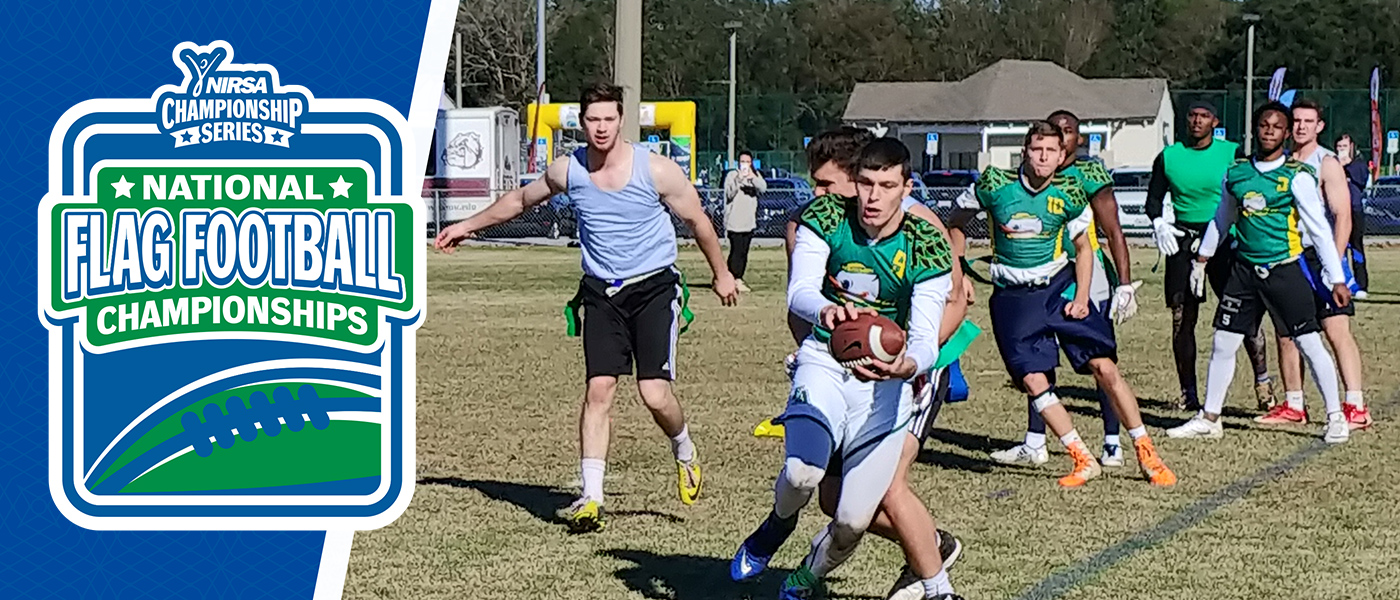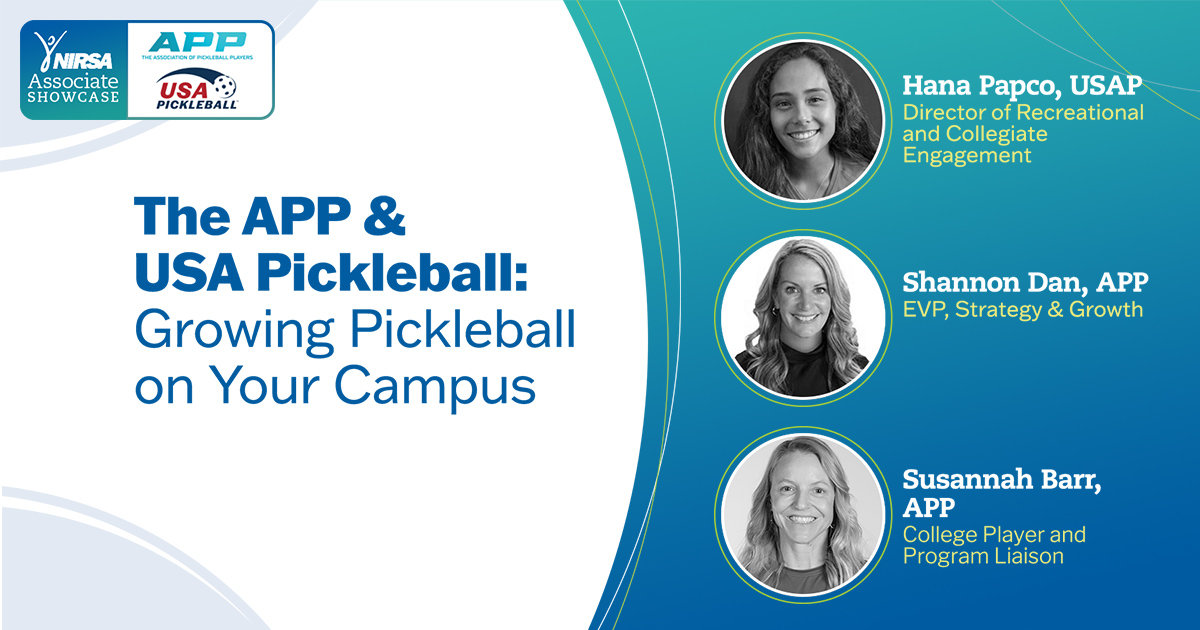As the sun set in the west, and the 2018 NIRSA National Flag Football Championship drew to a close, participants and volunteers came together to give each other hugs and handshakes to show their appreciation for a job well done over the last four days. This is not an uncommon scene at the tournament when the final whistle has blown and the final awards are handed out. However, as each person came together for congratulations and kudos, many came to a realization regarding this particular championship. After six consecutive years as the national site, and 39 consecutive years of participation in the Championship Series and with NIRSA, this would be the last national championship in Pensacola. The National Championship is moving to Round Rock, Texas in 2020. This year, though, the tournament got an amazing send-off with exciting action and outstanding games.
The weather was picture-perfect at Ashton Brosnaham Park in Pensacola, FL, with sunshine for the majority of the tournament and temperatures in the mid-to-high 60s. It was almost a fairytale backdrop as the championship welcomed a total of 644 participants and brought together 55 teams—11 Co-Rec, 20 Men’s, 10 Women’s, and 14 Open Non-Collegiate—to compete once more for the opportunity to be called the National Champion in their respective divisions.
Bring the action
Looking to change up the tournament this year, the competition committee started games a day earlier than in the past. Teams began checking in at Brosnaham Park Thursday morning, and teams could be seen taking repetitions and honing their playbook so they could be prepared going into the first set of games that evening. As twilight approached, team representatives congregated at the pavilion to get last-minute information and potentially a last look at their competition before becoming opponents. Overall, 17 states and Mexico were present and accounted for as play began Thursday evening.
On Thursday night, Friday, and Saturday, pool play brought the action as teams lined up and battled on offense and defense to gain the upper hand and advance to bracket play. During bracket play, the remaining teams engaged in high-octane play to make the cut and get into the championship picture on Sunday. New this year was an exhibition bracket, which allowed teams that did not make the championship bracket to play additional games and further enjoy their tournament experience.
A mix of familiar faces and new blood emerged as the ultimate victors of the tournament. The University of North Texas was crowned the new champion of the Co-Rec Division. The Women’s Division saw the University of Florida repeat as winners, its second championship in as many years. The Men’s Division also had a new champion as the University of Texas Rio Grande Valley, runners-up in 2017, became the new champion this year. For full results, including All-Tournament teams, All-American officials, photos, and archived webcasts of the championship games, check out the NIRSA Play Blog.
The @NIRSAChamp Twitter and Instagram accounts were abuzz with updates, videos, and pictures from the tournament. Hundreds of tweets and clips told a story of amazing catches, defensive prowess, and energetic play. The Instagram story was alive, too, with inside action and live-game play. The championship games were webcast live—with commentary by NIRSA Championship staff members Dave Peters of Florida State University and Marty Dempsey from the University of Florida—allowing supporters to watch the exciting championship games from far and away.
The excellence of volunteers and officials
A tournament of this magnitude relies heavily on proven leadership and a fantastic group of professional volunteers and student officials. The tournament had plenty of veteran leadership with the University of West Florida’s Jessica Coleman and Ohio State University’s Jarrode Davis co-directing the championship while UWF’s Jeff Schmitt as Director of Operation made sure each piece of the puzzle fit perfectly to make a beautiful flag football scene.
Jarrode states, “Each of our committees’ roles offer a different learning experience that have long lasting effects on their professional careers. Officials Committee members are challenged to elevate their understanding of flag football given the exceptional student officials that come to the national tournament—all while sharpening their presentation skills. Members of the Competition Committee and All-American Committee learn to work under intense time constraints all while pushing out accurate information. While most of the attention is focused on the in-game action, it’s the actions of these two committees that make the tournament run flawlessly.”
An important aspect of the tournament has been the student officials who dedicate their time to the event. Forty-nine student officials from all over the nation traveled to Pensacola with the goal of improving their skills and obtaining knowledge to bring back to their respective programs. Professional volunteers with extensive flag football officiating careers gave their time to impart wisdom and help provide feedback to each official for self-improvement.
“Student Officials have the most difficult job of anyone at the tournament,” Jarrode says. “Mental toughness and resilience are the two biggest skills student officials develop – to referee four to five games per day of elite competition and athletes takes unbelievable concentration. Not only that, but every decision student officials make is under a microscope—from players to clinicians—the ability to forget a tough play and move on from it mentally in order to get the next play correct can challenge any official of any skill level.”
A legacy like no other
The University of West Florida has had a tradition of excellence within NIRSA and the Championship Series. Year after year, UWF has been able to conduct a regional or national tournament with an energy and professionalism that has been its hallmark. Many students and staff have made their way to Pensacola knowing that they will experience an exceptionally-run tournament and take the skills they’ve gained back to their institutions to improve their programs. So what are the keys to running such impressive tournaments for the last 39 years?
Jeff Schmitt of West Florida gave some insight as to why the University of West Florida has been a premier host site for so long. “First, we invest in the people of the tournament,” Jeff says. “Participants, volunteers, everyone. We have done an excellent job solving problems before they becomes an issue. We have fostered a sense of hospitality to everyone coming to the tournament. We have this deep institutional knowledge and history of how the tournament has worked and what continues to be successful. We also have a willingness to put skin to the game and invest departmental dollars into the tournament to continue its success. Finally, we have had the support of the community. The city of Pensacola and Pensacola Sport have been instrumental in our success.”
Thanks to supportive institutions
This tournament could not have happened without the contributions of NIRSA members who took advantage of Institutional Registrations. We would like to thank the following institutions:
Gold level
University of Southern Mississippi
Silver level
Georgia Southern University
Bronze level
University of Maryland
The University of West Florida Recreation & Sports Services staff once again showed their exemplary service and hosting during the championship, and we thank them for their exceptional abilities. We bid a heartfelt farewell to Florida for the national tournament, and look forward to Texas as the NIRSA Flag Football Championship Series moves to Round Rock next year.
- For more information, please contact NIRSA National Sport Programs Coordinator Nicole Jackson.
Scott Flickinger is currently the Director of Campus Recreation at SUNY Cortland and the Chair of the NIRSA Member Network; you can email him at scott.flickinger@cortland.edu.







